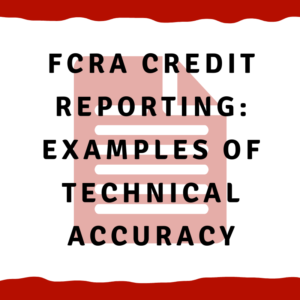FCRA credit reporting: examples of technical accuracy
FCRA credit reporting: examples of technical accuracy
A lot of times when we sue credit reporting agencies (Equifax, TransUnion, Experian) or furnishers (companies who provide information to the credit bureaus) under the Fair Credit Reporting Act (FCRA), they love to say “Well, yeah, but you know this is technically right. It might be a little deceptive, but it is technically right.”
There are ways to argue against this. We can flip this argument over on them.
Here are some examples of technical accuracy in credit reporting:
Let’s say I have a credit card that is due on the first of the month.
They charge me a late fee by the 15th of the month, and I pay it on the 28th of the month.
Can they report me as 30 days late?
I mean, I wasn’t paying it on time and I got to the 15th day which is the date of the penalty late fee.
Remember, credit reporting must be 100% accurate.
So if they say “John Watts is 30 days late” but I was really only 27 days late – this is a problem. Is 27 the same as 30? No.
If they want to report that John Watts was 27 days late, that’s accurate, truthful, and they can do that.
However, this is not how their credit reporting is set up. It is set up to report in increments of 30.
Credit companies only report 30 days, 60 days, 90 days, 120 days, and then charge off for missed payments when credit reporting.
Let’s say my payment is due on the 1st of the month and I don’t pay it at all that month.
I am clearly 30 days late.
Then, I pay it on the 15th of the following month. 45 days late.
If they were to mark me as 45 days late, this would be accurate and acceptable.
What if they round it up to 60?
This is not accurate. This is false credit reporting and should be disputed.
This also applies to Foreclosure in Alabama.
We used to file suits when the mortgage company would start taking steps leading to foreclosure.
They would break the law leading up to foreclosure, so we would sue them for breaking the law and wrongful foreclosure.
Our supreme court came along and said this doesn’t work because there are no “foreclosure proceedings” in Alabama.
The only foreclosure is when the literal auction happens in front of the court hours and then the deed is delivered to the winning bidder.
That’s it. That’s the foreclosure in Alabama.
There is no foreclosure beforehand.
So we find that mortgage companies in Alabama will often put a notation on the credit report that says “foreclosure proceedings”.
But, technically there are no “foreclosure proceedings” in Alabama. There is before the foreclosure, the actual foreclosure, and then after the foreclosure.
So, this is not technically accurate.
These bureaus and these furnishers want to be so precise with us. You’re 29 days late and they couldn’t report you late.
However, just one more day and now suddenly they can report you late.
You’re one penny short and they hit you with a $50 penalty for insufficient payment.
They can be technical because that’s what the law allows.
Let’s use the same standard against them for credit reporting.
If they are reporting me as 30 days late, I better be 30 days late.
If they are reporting me as foreclosed in Alabama, there better be a foreclosure that is happening this month.
Look at your credit report. Anything that is negative, that is harming you, study that very carefully. Is your report 100% complete and accurate?
Examine each part:
- The high balance
- The credit limit
- The payment history
- Is it joint?
- Is it a credit card?
- An installment loan?
- What’s the date of the last payment?
Look at every field to see if it is this literally true.
You may find that you need to dispute some portion of it.
Maybe it says January when it should say February.
It says 30 days late when you were actually only 25 days late.
Perhaps they say your vehicle was voluntary surrendered, but it was not voluntary and the vehicle was seized.
Study everything.
There is no easy way to do this. You have to put in the hard work.
Whether you are a credit repair person, or a consumer repairing your own credit, be very precise, and look at everything. Dispute it, explain why it is inaccurate.
Dispute this in a way that it will get fixed or deleted. If they don’t fix it or delete it, then sue them.
If you live in Alabama and you have any questions, feel free to get in touch with us.
We would be glad to help you in any way we can.
You can reach us by phone at 1-205-879-2447, or you can fill out a contact form and we will get in touch with you quickly.
Thanks for reading, and have a great day!
